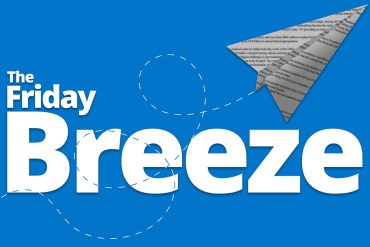Texas Disability Groups Want A Voice At The Table In Gun Debate
A disability rights groups in Texas wants to make sure people who’ve been disabled by gun violence in Texas get a chance to talk to lawmakers.
Must-Reads Of The Week From Brianna Labuskes
KHN’s newsletter editor, Brianna Labuskes, wades through hundreds of health articles from the week so you don’t have to.
Applying Silicon Valley Smarts To Age-Old Diseases
Customized iPhones are just one example of devices that can be used to combat health threats in developing countries. They are helping scientists in California and Cameroon attack the parasite that causes river blindness, an African scourge.
In A Puerto Rican Mountain Town, Hope Ebbs And Health Suffers
More than six months after Hurricane Maria, daily life in Castañer, Puerto Rico, is nowhere close to normal as residents try to deal with the effects of trauma, chronic stress and the continued lack of electricity.
Prueba logra que pacientes sean francos con sus médicos sobre la hipertensión
Los medicamentos contra la hipertensión, que previenen graves ataques, a veces generan efectos secundarios. Por eso muchos pacientes dejan de tomarlos… y le mienten a sus médicos.
Nation’s Top Doc Wants The Overdose Antidote Widely On Hand. Is That Feasible?
Surgeon General Jerome Adams urged more people to carry the drug naloxone, a lifesaving treatment for opioid overdoses. But this policy is tricky to implement.
Drug Test Spurs Frank Talk Between Hypertension Patients And Doctors
Roughly half of patients don’t take their high blood pressure medicine as they should, even though heart disease is the leading cause of death in America. Now, a drug test can flag whether a patient is taking the prescribed medication and is meant to spark a more truthful conversation between patient and doctor.
Decisión de Barbara Bush al final de su vida crea debate sobre los “cuidados paliativos”
Muchos creen que elegir los “cuidados paliativos” significa abandonar el tratamiento. Expertos aclaran por qué esta creencia es errónea.
Más mujeres que hombres sufren ahora una “aterradora” enfermedad pulmonar
La enfermedad pulmonar obstructiva crónica (EPOC) está afectando a millones de mujeres que comenzaron a fumar en los años 60 y 70, casi como una forma de rebelión.
Barbara Bush’s End-Of-Life Decision Stirs Debate Over ‘Comfort Care’
The former first lady’s announcement “not to seek additional medical treatment” and to focus on “comfort care” shone a light on end-of-life choices.
Safety Violations Compound Pain Of Painkiller Shortages
California and federal officials have cracked down on a major compounding pharmacy they say posed a threat to public safety, but their actions are worsening shortages of medications that doctors rely on to keep their patients out of pain.
‘Scary’ Lung Disease Now Afflicts More Women Than Men In U.S.
Barbara Bush’s case highlights that chronic obstructive pulmonary disease (COPD) — a disease linked to long-term smoking and traditionally considered a men’s disease — is now more prevalent among women.
KHN’s newsletter editor, Brianna Labuskes, wades through hundreds of health articles from the week so you don’t have to.
La lenta recuperación de Puerto Rico impacta en los pacientes de diálisis
Catorce pacientes que viven en Vieques y necesitan diálisis tres veces por semana deben volar a la isla principal para recibir tratamiento, luego que el huracán María destruyera la clínica local.
Puerto Rico’s Slow-Going Recovery Means New Hardship For Dialysis Patients
Since massive Hurricane Maria struck in September and knocked out the dialysis center on the tiny satellite island of Vieques, more than a dozen patients needing treatment now must fly several times a week to the main island.
PrEP Campaign Aims To Block HIV Infection And Save Lives In D.C.
Washington, D.C., is trying to stop new cases of HIV in the district by making sure residents who might be at risk are taking PrEP, medicine that cuts the risk of contracting the virus by 92 percent.
Una condición común y poco conocida: la pérdida de memoria luego de una cirugía
La disfunción cognitiva postoperatoria (DCP), puede afectar a un número considerable de adultos mayores después de una cirugía, y durar por largo tiempo.
What We Know And Don’t Know About Memory Loss After Surgery
Memory problems and trouble multitasking are among the symptoms of POCD, a little-known condition that affects a substantial number of older adults after surgery.
FDA Launches Criminal Investigation Into Unauthorized Herpes Vaccine Research
The Food and Drug Administration rarely prosecutes research violations, but its criminal division is looking into the experimental herpes vaccine research by Southern Illinois University professor William Halford.
Medical Marijuana’s ‘Catch-22’: Federal Limits On Research Hinder Patients’ Relief
Suffering Americans seek medical marijuana as an alternative to opioids and other powerful pharmaceuticals. Though legal in 29 states, some doctors say the lack of strong data makes it hard to recommend.





















